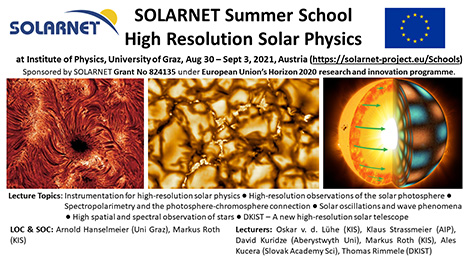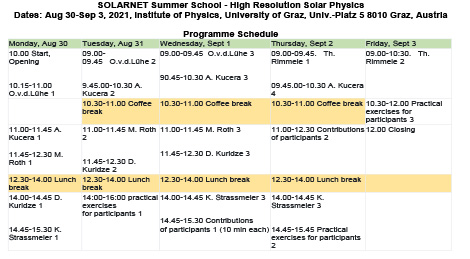Dates: Aug 30-Sep 3, 2021
Venue: Online only
How to apply?
For a limited number of participants we will pay for the accommodation. There will be no money for paying the travel expenses. The total number of participants is limited to 40. Please register and specify why you think you should be ranked among the first 40 candidates,
Registration
Registration starts on March 1 and closes on May 31st, 2021. You will be informed about the result.
Rationale
The Sun is the only star where fine structures down to sizes below 100 km can be observed directly. Numerical simulations of the dynamics of the solar convection zone and the photosphere have shown that processes at these small scales (and even smaller) are essential to understand the complex phenomena of solar activity like sunspots, chromospheric heating, flares, etc. This school, therefore, intends to provide the students an up-to-date knowledge on observational and theoretical aspects of high-resolution solar physics.
Lecturers
Instrumentation for high resolution solar physics.
Oskar v. d. Lühe, Leibniz Institute for Solar Physics (KIS), Freiburg, Germany
High spatial and spectral resolution observation of stars.
Klaus Strassmeier, Leibniz Institute for Astrophysics Potsdam (AIP), Germany
The photosphere-chromosphere connection, Spectroplarimetry
David Kuridze, Aberystwyth University, UK
Solar Oscillations and wave phenomena
Markus Roth, Leibniz Institute for Solar Physics (KIS), Freiburg, Germany
High resolution observation of the solar photosphere
Ales Kucera, Astronomical Institute of the Slovak Academy of Sciences, Tatranska Lomnica, Slovakia
DKIST A new high resolution solar telescope
Thomas Rimmele, DKIST, National Solar Observatory, USA
To motivate the participants also special sessions where practical exercises are developed and discussed will be given.
Besides the lectures, there will be space for own contributions and students are strongly encouraged to give short presentations of their research work. We expect students that are working on their thesis or young postdocs.


